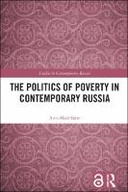Explore

The Politics of Poverty in Contemporary Russia
Ann-Mari Sätre
2019
0 Ungluers have
Faved this Work
Login to Fave
This book provides an overview of poverty and well-being in Russia. Increasing poverty rates during the 1990s were followed by greater attention to social policies in the 2000s and increased efforts to engage people in socially oriented NGOs and ‘encourage’ them to contribute to the fulfillment of social aims. What impact did these developments have on the prevalence of poverty in contemporary Russian society?
Tracing continuities from the Soviet system alongside recent developments such as the falling price of oil, economic sanctions, and changes in directions of social policy, this book explores the impact of poverty, inequality and social programmes. The author examines the agency of people living in poverty and those engaged in social policy, using official statistics, survey data and interviews from four Russian regions to explain the reasons and consequences of poverty and people’s attempts to get out of it.
The approach is based on institutional theory, complemented by Amartya Sen’s capability approach highlighting the importance of agency and an institutional framework as a means for change. A timely book that will be of interest to students of contemporary Russian politics as well as those engaged in social policy issues.
This book is included in DOAB.
Why read this book? Have your say.
You must be logged in to comment.
Rights Information
Are you the author or publisher of this work? If so, you can claim it as yours by registering as an Unglue.it rights holder.Downloads
This work has been downloaded 25 times via unglue.it ebook links.
- 25 - pdf (CC BY-NC-ND) at Unglue.it.
Keywords
- Central / national / federal government policies
- Politics and government
- Social welfare and social services
Links
DOI: 10.4324/9781351169448Editions

